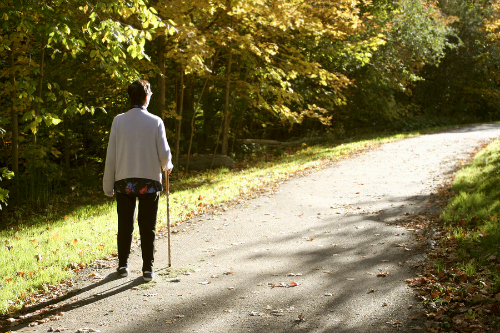Gloria and her daughter were enjoying a Sunday picnic in one of the many neighborhood parks that they had been to countless of times. They chatted about how beautiful the sun’s rays appeared as shafts of light pored through the branches of a neighboring pine. They spotted a cardinal nestled in its upper branches—the red a stark contrast against the evergreen. It was a good day. Her daughter left for a moment to use the nearby restroom. When she returned, her mother was gone.
Wandering can leave those that love the people suffering from Alzheimer’s in a panic. If they are unprepared, it may feel like their whole world is crashing down around them. One in nine people over the age of 65 will develop this currently incurable disease. And six out of every 10 of those people will wander. And some will never be found.
Understanding the Problem
An article in Huffington Post quotes Kimberly Kelly, founder and director of Project Far From Home: “There’s approximately 125,000 search-and-rescue missions where volunteer teams are deployed…for missing Alzheimer’s patients every year.” Yet many families do not realize the number of people with Alzheimer’s that go missing or that their own loved one is at risk. Nor do they understand that most Alzheimer’s patients who wander do not consider themselves lost and, therefore, do not reach out for help. They are simply looking for something, often a place or time that feels familiar.
How you can Help
- Enroll your parent in Silver Alert, or another program in their area that identifies missing seniors. If your loved one goes missing, call 9-1-1 immediately—you do not need to wait the 24-hour mandatory period usually required in missing person’s cases.
- There are several GPS type tracking devices designed with seniors in mind. These can be worn as a bracelet, anklet or placed in a pocket. Some are even found in tennis shoes. There are some models that are designed to alert the caregiver should their loved one step out of preset boundaries while others that maintain a constant vigil of the wearer’s location. Of course, the trick is ensuring that your loved one is always wearing the device.
- Create a daily plan and routine for your loved one to help them feel a sense of stability in their ever-changing world.
- Include exercise and some time spent in the sunlight every day. Make their evening routine relaxing and enjoyable.
- Avoid crowded areas such as shopping malls that may lead to confusion.
- Provide supervision and use devices that signal when a door or window has been opened.
- Consider installing a video camera system.
- Alert your parent’s neighbors to the potential problem and ask one of them to be a point of contact should you be notified from a tracking or other device that your parent has left their home.
- Consider obtaining the services of a senior care provider who can care for your loved one when you or other family members are not available.
Resources
http://www.huffingtonpost.com/2013/07/26/wandering-alzheimers-_n_3653267.html
http://www.alz.org/care/alzheimers-dementia-wandering.asp
If you or an aging loved one are considering hiring senior care in Los Gatos, CA, please contact the caring staff at Home Helpers today (408) 259-5930.

